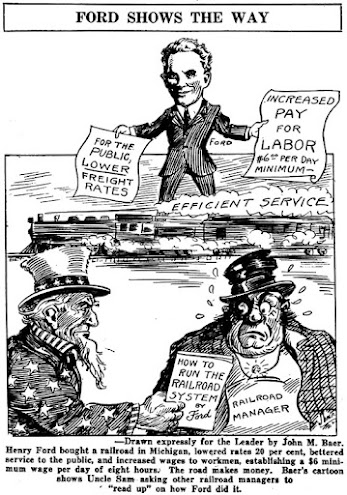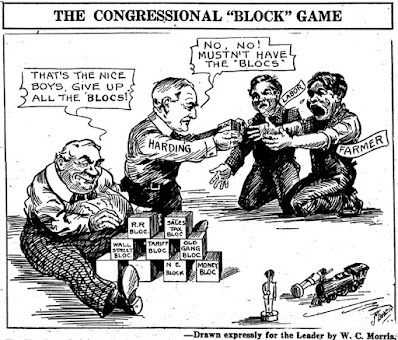Hey, kids! It's time to catch up on all the domestic national news from October, 1921!
We'll start with something that seems as relevant today as ever, because, like the weather, everybody talks about it but nobody ever does anything about it.
 |
| "Rather Late Canning Time..." by Clifford Berryman in Washington (DC) Evening Star, Oct. 13, 1921 |
It was Republicans who had complete control of the White House and both houses of Congress in 1921. But the filibuster was a favorite tactic of senators from southern states — Democrats in those days — who would thwart an anti-lynching bill throughout the entire 67th Congress.
Other legislation killed by filibusters from both parties during that congressional session included the Harding administration's ship subsidy bill, a Railroad Refunding bill, the Rogers Foreign Service bill, the "Blue Sky" securities regulation bill, the Radio Regulation bill, and a Statute Codification bill.
 |
| "So Near, And Yet" by Bill Sykes in Philadelphia Public Ledger, Oct. 10, 1921 |
If getting legislation passed was easier said than done, so was breaking Americans' alcohol habit. Prohibition was in its second year, and not only were folks learning how to brew hooch in their private basements, but since not every home has its own basement, a thriving black market in liquor had sprouted up across the country in major cities and small towns.
 |
| "Autumn Leaves..." by Ted Brown in Chicago Daily News, by Oct. 27, 1921 |
Ted Brown's consumers look mighty happy with their crop, for now. Who that fellow is back there saying "Never again," I'm afraid I can't tell.
 |
| "Is He Worth It?" by John Cassel in New York Evening World, Oct. 19, 1921 |
The major national story of October was a threatened strike by railroad workers for better pay and working conditions. This was three decades before the interstate highway system; trains, not trucks, were primarily responsible for transporting goods across the country, as well as for passenger travel and mail delivery.
 |
| "There's a Limit to All Things" by Albert Levering in New York Tribune, Oct. 23, 1921 |
Railroad corporations demanded significant cuts in wages and benefits to their workers in 1921, and also increased farming out work to non-union sub-contractors. Five major unions indicated they were all set to go out on strike, but the Railroad Labor Board ordered union leaders to keep their workers on the job. After the Board consented to delay Interstate Commerce Commission orders to slash half of the increases workers had enjoyed during World War I, union members voted to cancel the strike.
It was only a temporary peace, kicking the can down the railroad; the unions would go on strike within a year when that pay cut delay ended.
 |
| "Ford Shows the Way" by John Baer in Nonpartisan Leader, Fargo ND, Oct. 31, 1921 |
As peculiar bedfellows as they may have been, leftist former Congressman John Baer (Nonpartisan League-ND) here holds up right-wing Republican Henry Ford as an example for how to run a railroad. Baer cartooned for the National Railroad Union newspaper Labor as well as the Nonpartisan League's official paper (which was published in Minneapolis as the National Leader after the October 31, 1921 issue).
Looking to improve supply and distribution lines for his auto plant in Dearborn, Ford bought the Detroit, Toledo and Ironton Railroad in 1920, modernizing and transforming it, in the words of railroad historian William Pletz, "from a streak of rust into an extremely efficient and profitable operation, the likes of which has or will seldom be seen in this country."
Under Ford, DT&I employees made higher wages than others in the industry. He also launched an electrification program for the railway, which was, however, abandoned after he sold the DT&I (at a hefty profit) to a subsidiary of the Pennsylvania Railroad in 1929.
 |
| John Baer in Nonpartisan Leader, Fargo, Oct. 31, 1921 |
 |
| "Th' Hog" by William Sykes in Philadelphia Public Ledger, Oct. 3, 1921 |
Oh, and the World Series was held in October, but it was the New York Yankees vs. the New York Giants, so nobody beyond the outer boroughs really cared all that much.
(Just kidding. Even game 4 getting rained out made banner headlines across the country. And the Giants took the series five games to three.)
No comments:
Post a Comment